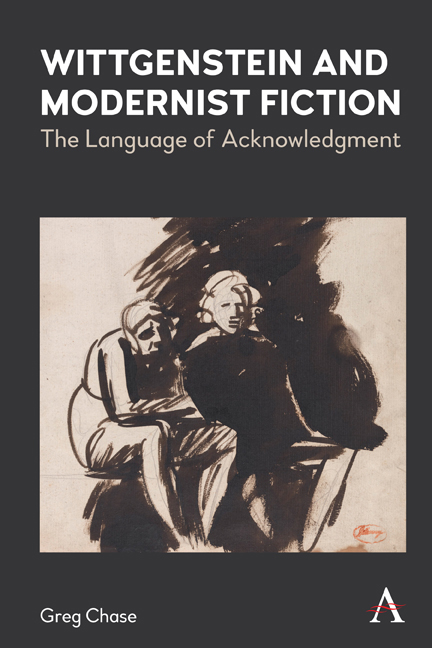Book contents
- Frontmatter
- Contents
- Acknowledgments
- List of Abbreviations
- Introduction: Modernist Philosophy and Modernist Fiction
- 1 “Who’s ‘We’?”: Claims to Community in Forster’s Howards End and Woolf ’s Mrs. Dalloway
- 2 “The Silent Soliloquy of Others”: Wittgenstein’s Pursuit of Acknowledgment
- 3 “To See with the Same Eyes”: Marriage and Same-Sex Intimacy in Ford, Woolf, and Larsen
- 4 Fragmenting Families, Private Language Fantasies: Faulkner’s The Sound and the Fury and As I Lay Dying
- 5 Seeing Humans as Humans: Wright’s Black Boy and Ellison’s Invisible Man
- Conclusion: Afterlives of Acknowledgment
- Notes
- Bibliography
- Index
Introduction: Modernist Philosophy and Modernist Fiction
Published online by Cambridge University Press: 27 April 2022
- Frontmatter
- Contents
- Acknowledgments
- List of Abbreviations
- Introduction: Modernist Philosophy and Modernist Fiction
- 1 “Who’s ‘We’?”: Claims to Community in Forster’s Howards End and Woolf ’s Mrs. Dalloway
- 2 “The Silent Soliloquy of Others”: Wittgenstein’s Pursuit of Acknowledgment
- 3 “To See with the Same Eyes”: Marriage and Same-Sex Intimacy in Ford, Woolf, and Larsen
- 4 Fragmenting Families, Private Language Fantasies: Faulkner’s The Sound and the Fury and As I Lay Dying
- 5 Seeing Humans as Humans: Wright’s Black Boy and Ellison’s Invisible Man
- Conclusion: Afterlives of Acknowledgment
- Notes
- Bibliography
- Index
Summary
Literary scholars often assume that works of early twentieth-century fiction question the capacity of language to picture the world accurately. Formulating a now widely influential position, Frederic Jameson argues that modernist literature presents “objective truth” as “a thing of the past” and portrays every human subject as “locked into his or her private language.” This conception of modernism finds much to recommend it in the period's canonical works. In Joseph Conrad's Lord Jim (1900), Marlow explains that whereas he had formerly been “so sure of the power of words,” his efforts to relate Jim's story have made him “afraid to speak”; he “perceive[s] how incomprehensible, wavering, and misty are the beings that share with us the sight of the stars and the warmth of the sun.” The narrator of Jacob's Room (1922) by Virginia Woolf writes of how “masters of language, poets of long ages, have […] addressed themselves to the task of reaching, touching, penetrating the individual heart. Were it possible! But words have been used too often; touched and turned, and left exposed to the dust of the street” (126). The titular character in Samuel Beckett's Molloy (1955) voices a similar sentiment, commenting that “every time I say, I said this […], or find myself compelled to attribute to others intelligible words […], I am merely complying with the convention that demands you either lie or hold your peace.” Such moments indicate the emergence of a collective anxiety, among a range of writers, that the words at their disposal were no longer adequate to their expressive purposes.
It is undeniably true that modernist fiction is replete with expressions of mistrust about its own medium. But need we assume that the target of critique in such moments is always language itself ? Consider the example of Jean Toomer's Cane (1923). In the climactic scene of “Kabnis,” the work's last and longest vignette, Toomer represents the dialect speech of a disaffected African American schoolteacher named Ralph Kabnis, who explains that he has “been shapin words t fit m soul” and expresses frustration that those at his disposal “wont fit int th mold thats branded on m soul.”
- Type
- Chapter
- Information
- Wittgenstein and Modernist FictionThe Language of Acknowledgment, pp. 1 - 20Publisher: Anthem PressPrint publication year: 2022



